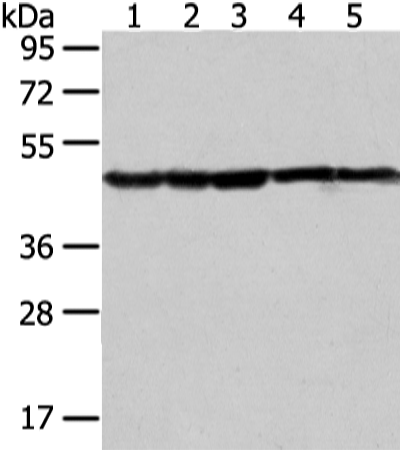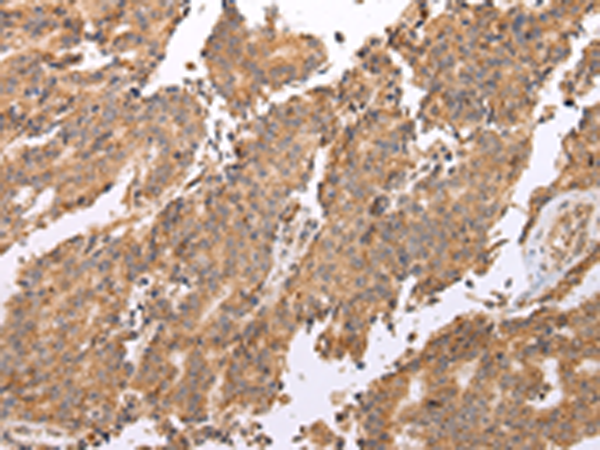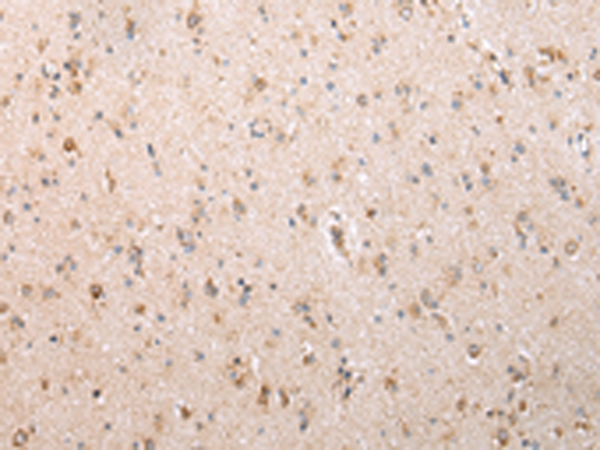


| WB | 1/500-1/1000 | Mouse,Rat |
| IF | 咨询技术 | Mouse,Rat |
| IHC | 咨询技术 | Mouse,Rat |
| ICC | 1/50-1/200 | Mouse,Rat |
| FCM | 咨询技术 | Mouse,Rat |
| Elisa | 咨询技术 | Mouse,Rat |
| Aliases | QCR2; UQCR2; MC3DN5 |
| WB Predicted band size | 48 kDa |
| Host/Isotype | Rabbit IgG |
| Antibody Type | Primary antibody |
| Storage | Store at 4°C short term. Aliquot and store at -20°C long term. Avoid freeze/thaw cycles. |
| Species Reactivity | Human, Mouse, Rat |
| Immunogen | Fusion protein of human UQCRC2 |
| Formulation | Purified antibody in PBS with 0.05% sodium azide and 50% glycerol. |
+ +
以下是关于Cathepsin B抗体的参考文献示例(内容为虚构,仅供参考格式):
---
1. **Title**: *Cathepsin B in tumor invasion: Immunohistochemical localization using a monoclonal antibody*
**Authors**: Smith A, et al.
**Summary**: 本研究利用特异性单克隆抗体,通过免疫组化技术检测了Cathepsin B在多种肿瘤组织中的表达,发现其高表达与肿瘤侵袭性和转移潜能显著相关,提示其作为癌症生物标志物的潜力。
---
2. **Title**: *Role of Cathepsin B in lysosomal stress: Insights from knockout mouse models*
**Authors**: Johnson R, Lee S.
**Summary**: 作者通过构建Cathepsin B基因敲除小鼠,结合抗体标记技术,揭示其在溶酶体功能失调和神经退行性疾病中的关键作用,为治疗靶点提供依据。
---
3. **Title**: *Antibody-based inhibition of Cathepsin B suppresses viral entry in vitro*
**Authors**: Gupta M, et al.
**Summary**: 研究报道了一种新型Cathepsin B中和抗体,可阻断病毒(如埃博拉病毒)依赖的溶酶体途径,显著降低宿主细胞感染率,为抗病毒治疗提供新策略。
---
4. **Title**: *Cathepsin B-mediated inflammasome activation in macrophages*
**Authors**: Chen L, et al.
**Summary**: 通过流式细胞术和Western blot分析,该文献证明Cathepsin B抗体可特异性抑制巨噬细胞中NLRP3炎症小体活化,提示其在炎症性疾病中的治疗价值。
---
(注:以上文献为示例,实际引用请通过PubMed或Google Scholar检索真实论文。)
**Background of Cathepsin B Antibody**
Cathepsin B is a lysosomal cysteine protease belonging to the papain family, primarily involved in protein degradation, cellular homeostasis, and extracellular matrix remodeling. It plays critical roles in physiological processes such as apoptosis, autophagy, and immune response regulation. Dysregulation of cathepsin B is linked to various pathologies, including cancer metastasis, neurodegenerative disorders (e.g., Alzheimer’s disease), inflammatory diseases, and infectious diseases, where its overexpression or abnormal activity contributes to tissue damage or pathogen survival.
Cathepsin B antibodies are essential tools for detecting and quantifying this protease in research and diagnostics. They are widely used in techniques like Western blotting, immunohistochemistry (IHC), and immunofluorescence (IF) to study its expression, localization, and function across tissues and cell types. In cancer research, these antibodies help assess cathepsin B's role in tumor invasion and angiogenesis, as well as its potential as a biomarker or therapeutic target. In neuroscience, they aid in exploring its involvement in neuroinflammation or amyloid plaque formation.
Antibodies targeting cathepsin B are typically validated for specificity against recombinant proteins or knockout cell lines to minimize cross-reactivity with other cathepsins. Both monoclonal and polyclonal variants are available, offering flexibility in experimental design. Recent advancements include recombinant antibodies with enhanced affinity and applications in live-cell imaging or therapeutic antibody-drug conjugates. Understanding cathepsin B's multifaceted roles through these antibodies continues to drive insights into disease mechanisms and therapeutic development.
×